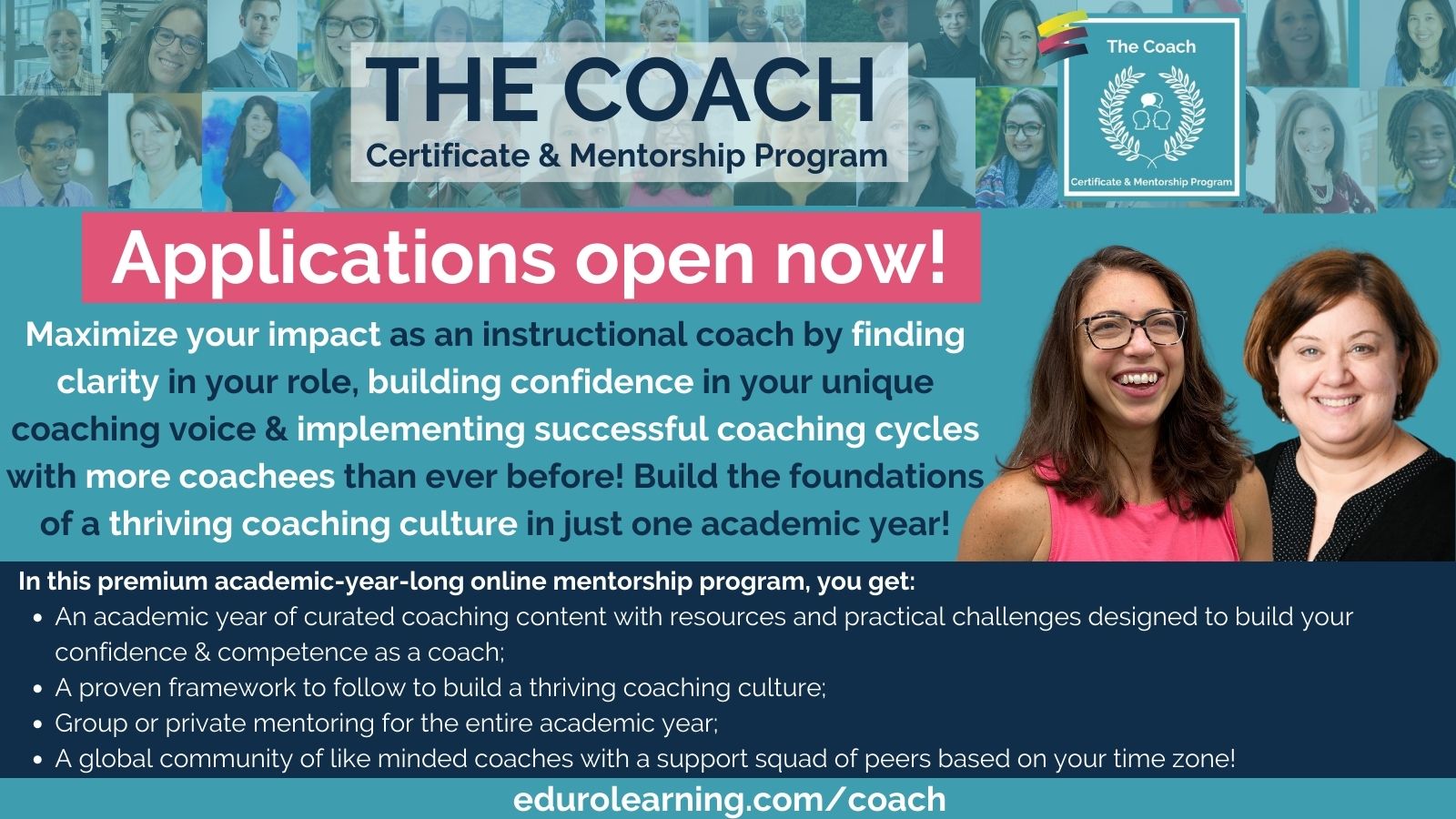This #coachbetter conversation focuses on what instructional coaches can do to help establish a culture of coaching. Our guest, Kim Lelek gives practical advice for any leader or coach who has ever wondered how they can inspire and transform student learning.
Subscribe to #coachbetter via your favorite Podcast Player!
Featured Guest

Bonus! Watch the Spotlight Version on YouTube!
Show Notes
Early Childhood teaching degree from Canada, taught up to grade 10. 4th year in Switzerland, EdTech Coach in Upper Primary. 6th year in this role, was in Singapore before.
Whether you’re a 4-year-old or a 48-year-old, you learn the same way. A learner is a learner. Across the spectrum, education or corporate, there needs to be meaning, people need to understand WHY they’re doing things.
Building Rapport in your teaching community, what are your routines (walking the hall, eating lunch in the staff room) “The Coaching Bank” – how do you make connections with colleagues on a professional level, not just a personal one
By listening to people, to get to know them personally, find out about their family. The more little connections you can have the better. Realizing that everyone has strengths and weaknesses, doesn’t matter how old you are. Identifying that and recognizing that is very powerful. Acknowledging that everyone has opportunities to shine, and opportunities for growth.
Building a Culture of Coaching: Where/How do you start? Being an advocate for the importance of your role
Listen and pick the people you can work with, who can champion with you. There’s 3 types of people you’re working with: high flyers, middle who want to move but don’t know how to get there, and the resistant. Don’t work with high flyers, they’re fine. Don’t work with resistant. Start with the middle. Motivate people by highlighting the good that they’re doing, sharing great things. Working at the individual level to help in areas where you see they need support. Identifying and knowing the people you’re working with. Being strategic about seeing and celebrating strengths as well as opportunities for growth.
Try to build a strong student network. It’s OK to ask the students.
Staying motivated as a coach when you’re “the only one” who cares about tech-rich learning
Having a network of coaches either in or out of your school. Sharing issues with others, to know that you’re not the only one who’s fighting this battle. Finding those “little wins” and appreciate that. It doesn’t always have to be this huge grand thing. Acknowledge when you’ve brought something into the curriculum and it’s changed a student – doesn’t have to be the whole school, it can be one person. Even if we don’t always see it or hear it, good things are happening, embrace it.
2 min teacher spotlight in staff meetings, videos created and presented by teachers to share great things.
When you’re working with a team, if you can get one person on board, and then have that team member share with the rest of the team, they will be more likely to listen.
The challenge of being “understood” as a coach – teachers don’t know what you do / think you just have free time
At the beginning of every year, re-frame the role to all staff. Checks in throughout the year to ask if things are working with each team. Starting with “this is how I supported the team last year, this is how I’m anticipating how I could support you this year. What do you think? Is there anything else I can do?” Giving them the voice to give direct feedback.
The many hats of coaching: coach, consultant, co-teacher, etc
Main role: attend weekly team meetings for curriculum planning, making curriculum connections for technology just in time with each grade level. Second focus: identifying within the group how you can help individual people. Third focus: making connections with students, meeting the needs of individuals. Tech gives all students a voice – it doesn’t matter if you’re new to the language, or if you have specific academic needs, tech provides an opportunity for all students to have a voice. Another overlying focus: digital citizenship throughout the school – with the students and with the teachers – developing a culture of responsible digital citizenship. Another role is the technical / administrative side, connecting to Smart Board, creating a form, etc. Another role is holding PD within the school. Another role is dealing with parents.
What does data look like from coaching? What are you using to help motivate teachers to make improvements/changes? Assessing tech & tech integration, how do you give it value (teacher evaluation, teacher growth): “More Than Ticking the Box”
Not consistent, sometimes its taking notes & keeping track of what she’s been doing on a professional blog, and then going back and asking for feedback. Tried spreadsheets.
What are ways that you make yourself invaluable as a coach? What are the things that teachers love that you do?
They know that they can come and ask me anything. It doesn’t matter how basic or how challenging. Always being as available as possible. Being willing to listen and not be judgemental. Letting them see that you value what they are doing, even if it’s really small, and helping them make the connection to see how much they’ve grown.
Where do coaches fail? And what can we do about it?
Not taking it personally. When people don’t listen to us, we can take it really personally. Trying not to take it personally. You don’t know what’s happening with people’s lives at home, you don’t know why people have chosen not to do this. It’s easy to shut down and not work with those people again. Instead, sit down and talk to the people you’re struggling with.
Overscheduling is a challenge. Leaving some spots open on the calendar, or prioritizing.
Tips for getting started as a coach in a new school
For a new coach, be patient with yourself, you’re not going to solve the world’s problem in that first year. Sit down and listen and talk to as many people as you can: teachers, leaders, students, and see where the school is at. Realize that change can be slow and people can be resistant. Don’t take that personally, but look at why that’s happening. If you want to implement a new idea, it can’t just be seen as tech, you need curriculum and leadership on board as well, make sure they’re supporting you too. Try to schedule some time for yourself throughout the day. Asked teachers how much prep time they get and then scheduled that in to her calendar at the start. If you’re finding it’s a slower time, can remove those times and be more flexible. Get into the classrooms, make sure you’re not always just sitting at your desk.
What’s one resource you would recommend and why was it impactful for your practice?
Getting to know other coaches through Twitter or conferences, building a PLN. It’s hard to define this role in isolation. Helps to hear other strategies.
Level Up Your Coaching with The Coach!
If you are ready to dive deep into your coaching practice, to help you #coachbetter and build a thriving coaching culture in your school, please join us for our next cohort of The Coach!
Wherever you are in building a coaching culture in your school, The Coach will give you the strategies, skills and tools you need to make coaching a success and will empower you to confidently apply instructional coaching strategies in any situation – from building a coaching program, to having coaching conversations, to being a leader in your school community. We facilitate only one cohort each academic year so we can offer individualized support for each participant.
Coaches of all levels are welcome: you’ll start the program with a self-assessment to determine exactly what the next steps are for you!
Registration for our next global cohort opens once a year – check the website for details!






Recent Comments